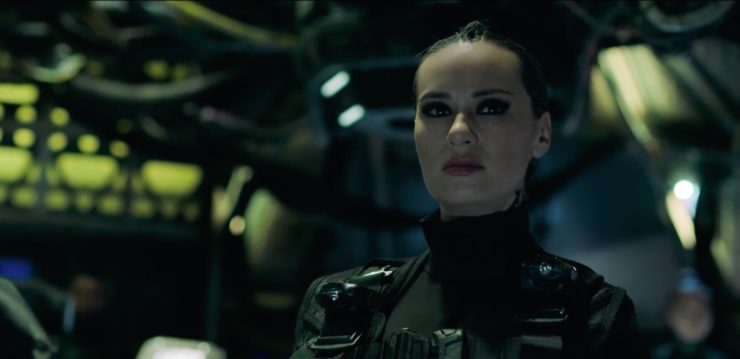We’re almost to the end of an incredibly good season, even for The Expanse. Tense action, nuanced performances, and a quiet treatise on a better way to live: “Winnipesaukee” is the show at its best. The table is neatly, brilliantly set for next week’s season finale.
Spoilers for episode 9, “Winnipesaukee,” follow!
I love a show that can tell you one of its thesis statements without making it feel like a grand proclamation. This season keeps returning to Amos’s thoughts on tribes, which he delivered like just another rough life lesson. Amos doesn’t always say a lot, though, so the things he says tend to stick, as we saw with Clarissa’s repetition of his “take whatever they give you” mantra.
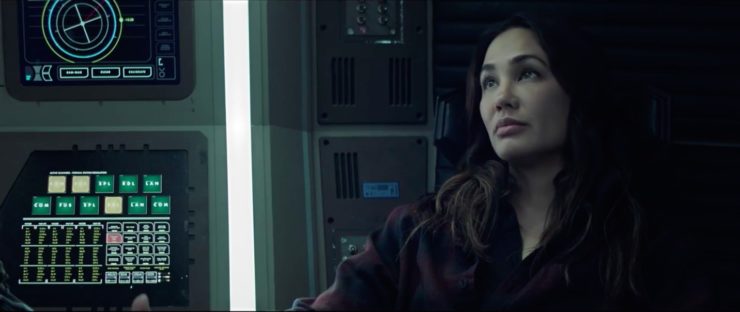
But Clarissa took something from the tribes concept that Amos didn’t expect: If tribes get smaller when things go wrong, then maybe the way to recover is to make the tribe bigger again. For Clarissa, the concept isn’t just about how things fall apart, but a lesson in how to put them back together again. Looking at it that way shifts it from a scarcity mentality to an abundance mentality. What if people didn’t have to prove they’re “worth” something?
Her exchange with Erich is great:
Buy the Book


Remote Control
“Maybe just being people who need help is enough. If we decided to include everyone in our tribe without demanding that they prove we need them, maybe people wouldn’t have thrown rocks at us in the first place.”
“Jesus christ. Where did Timmy find you?”
“Serving a life sentence for multiple homicides.”
Clarissa’s hope, her optimism, is hard-won. She’s been living in an underground cell for a while now. Everything she’s done and said since the rocks hit is something she never thought she’d get to do or say. Of course she wants everyone to have another chance, a way out, another day to feel the wind in their hair. When she and Erich and Amos stand in a circle outside the big fancy rich-people house, arguing about bringing along the left-behind staff, they embody three very different ideas about how to live: Take what you can and build power. Just keep surviving, looking out for your own. Or find a way to reach out—which she’s doing even in as small a moment as when she explains herself to Erich.
Sure, it’s Clarissa’s murder skills that really gain his respect. But shoving them together in the ship and letting them talk a little leads to connection, too. This happens with Amos and Hutch, talking in the snow. Their conversation clears his mind and lets him find the solution to the ship’s problem, but it also connects them. The way they look out for and save each other in that intense planet-escaping sequence beautifully underscores the ways these things happen—in small moments and large, in casual chats and moments of extreme duress. The tribe gets bigger.
Clarissa’s argument spins out among the stars, too; we follow it—and Naomi’s message—from ship to ship, seeing all the ways these far-flung people choose or desire to come together or break apart. Marco talks about being a uniter but isolates and divides people, driving wedges between them, insisting on loyalty to him above all else. (The way he twists Naomi’s escape, turning it into a weapon with which to bludgeon conflicted, grieving Filip, is incredibly cruel, even for him.) But loyalty to a person isn’t loyalty to people. The way he smiles when he talks about a crew lost in battle—their loss is nothing to him. What matters is the glory and the triumph. Marco’s tribe is Marco, with everyone else obeying.
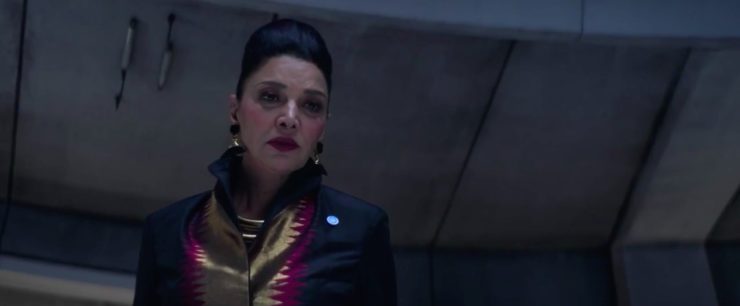
Avasarala is right: Marco is an extremist and a danger to everyone, Earther or Belter. Her return to power feels almost inevitable, but happens in a way that leaves room for so many questions. You can read her defiance of the sec-gen’s actions in at least two ways: One, she’s in the middle of overwhelming grief and cannot stand the thought of subjecting more people, Belter or not, to that feeling. Two, she’s a canny political operator who understands that by taking the dramatic gesture of resigning, she creates a path for the rest of the council to stand up against Paster and his performative retaliation. Surely she knows their opinions, and their behaviors, better than the freshly appointed acting sec-gen does.
Was she playing a part in order to set an example, to give everyone else an out they might’ve been leery of taking alone? Or was it sincere? The answer, I think, is both, and that’s why she’s so good at what she does. But she’s also changed since first season, when there was a lot more hard-ass and a lot less empathy in her actions.
It’s not until after Avasarala stalks out of the council room that she goes to the towering memorial wall and adds Arjun’s name. In every close-up, you can see Shohreh Aghdashloo find Avasarala’s acceptance of the reality of her loss: the way she watches the memorial, and the pain when she says out loud, finally, that she’s lost her husband. The way she says this makes him into political leverage, which would have infuriated him. But her grief is real, and she’s acting from a place of empathy. The sec-gen dismisses her for being emotional, but her response is tactical and wise. She only digs into an emotional appeal because her rational statements weren’t working.
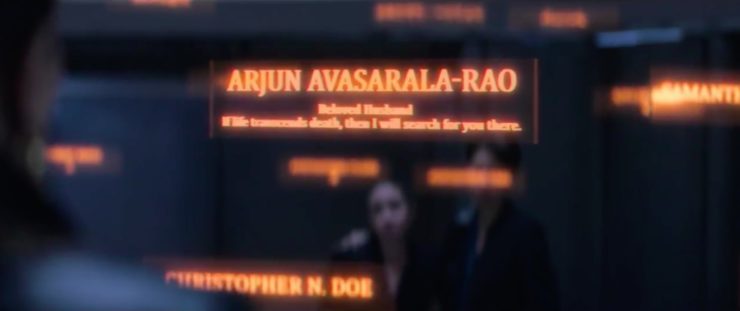
What she says in that council is, again, a variant on what Ashford said at the end of last season when he wanted someone to hold back and not kill another man: “He is not only himself. He is everyone who cares for him.” Season five keeps coming back to this reminder: There is no suffering that doesn’t touch someone else. Marco does know this, but he only uses it as a weapon: Naomi is not only Naomi, but the people on the Roci who love her, who he can hurt. Drummer is not just Drummer, but her whole family and the memory of the people she’s lost.
This is what Amos needs to be reminded of, why he said he needs to get back to his ship. It’s the position Avasarala understands they need to govern from: respecting people, remembering that every one of them is a network of friends, family, lovers, connections. Delgado finally gets to the end of his joke, and it lands with a thud because it’s about painting all Belters as the same, and as lesser. “It used to be funny,” he says, a little mournfully. It’s harder to laugh at someone’s perceived inferiority when you’re being reminded they’re not that different from you.
Naomi, meanwhile, is a tribe of one. The contrast between her position and Amos’s is crushing: He’s getting off the ground because all of them, him and Peaches and Erich’s people, worked together; Naomi desperately needs to get off the Chetzemoka, but no one can help her. And it’s so much harder to be alone. All of her despair and fear is so palpable. The scene when she sees the Screaming Firehawk is near and goes from delight to agony is a wordless stunner.
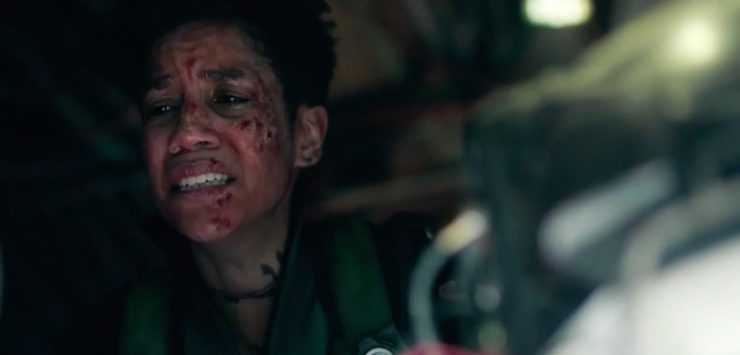
Dominique Tipper is, as ever, brilliant, but so is the writing: Letting her scenes be quiet, letting that quiet emphasize her solitude, and setting it all against all the shouting and stress of the other narratives is incredibly effective. The way these scenes are shot, the claustrophobia of it, the dimness—they’re so intense and so vivid. There are a lot of lessons here about the power of trusting your audience, of leaving things unsaid and letting them spin out slowly and naturally. (Those knocks! At the end! I’m glad I don’t remember every detail of the book, because the anticipation of waiting to see what Naomi does next is delicious.)
All of these questions—tribes, loyalty, where we draw the lines around what and whom we care about and fight for—resonate the most intensely in Drummer’s storyline. After years of being fairly solitary, working for powerful men, Drummer found a bigger tribe. She had friends, of course, and we don’t really know what she did before she was on Tycho. But it’s obvious her situation is different, and though she’s not the most demonstrative, affectionate type, we know that if she’s with them, it’s where she wants to be. She doesn’t suffer fools and she doesn’t stick around when a situation isn’t working for her.
To say their current situation is “working” for anyone other than Marco would be an exaggeration. To walk away is to paint a target on their own backs, but to stay is to be used, the same way Marco uses everyone. He could send any ship to destroy the Rocinante, but he wants to send hers, to claim her as his tool and to make her life hell. To make her choose between the relative safety of his Free Navy and the life of her friend—and to put her family’s life in the balance.
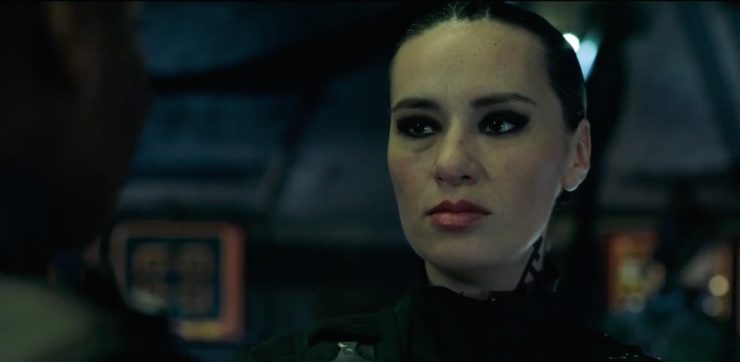
Drummer has chafed against the pressure to join Marco since the beginning—not just out of anger, though she has plenty of that, but because he essentially left her no choice. Drummer has exercised her freedom repeatedly, walking away from situations that didn’t work for her, pushing back on Ashford until they found space to respect each other. She takes no shit. But now she’s absolutely eating shit thanks to Marco and Karal’s power over everyone she loves who is still alive.
If anyone can find a third path—something that isn’t following Marco’s orders or turning tail and running—it’s Drummer, whose rage Cara Gee embodies with breathtaking intensity. The dilemma in front of her is framed as her family or Naomi. Their safety or Naomi’s life. But it’s a much bigger question than that, really. It’s Marco or the Belt. Obedience or freedom. Precisely and horrifically, Drummer’s situation encapsulates what Marco’s power means for the Belt as a whole: Take what he’s doing to her and extrapolate it across the stations and ships.
This episode is dense with connection and ideas, with so much that echoes across the season and the show as a whole: the tension between who a person is and what they do; the way, as Amos puts it, no one ever really leaves anything behind; and the damage people can do as they jockey for power and position. It feels so different than previous penultimate episodes (though the fight to get off-planet retains all the action-sequence tension the show needs), but then, this season as a whole feels different. It’s the first time the only enemy is just us: people being people. The finale has a lot to do to tie things up, but it’ll likely also set up the sixth (and final) season. Are we getting rid of Marco this season? Signs point to no.
FLOTSAM & JETSAM
- Marco’s display again had an image I’m not sure what was—the ship arcing toward a planet. I love pausing to stare at those images almost as much as I love anticipating what they’re going to mean.
- When Avasarala makes herself comfortable in Delgado’s office, she tosses aside that grand gold-trimmed jacket/robe she’s been wrapping herself in. She’s still wearing a lot of very regal gold, but she’s back to business in a suit. Her costumes are truly a work of art.
- Karal does the best smirks.
- The folks on the Roci and the Screaming Firehawk get one scene apiece this week, just a check-in, and it made me think about how deftly this show passes the narrative among its characters. Last season, Holden was at the center of everything, but it doesn’t feel wrong at all to have him largely sidelined. It feels like the way life works; sometimes a person is in the thick of things, and sometimes they’re somewhere else. (Plus, he needed a break from saving the system.)
Molly Templeton lives and writes in Oregon, and spends as much time as possible in the woods. You can also find her on Twitter.










